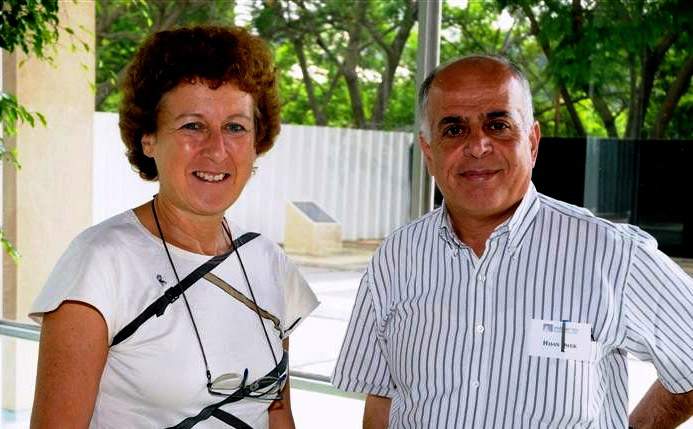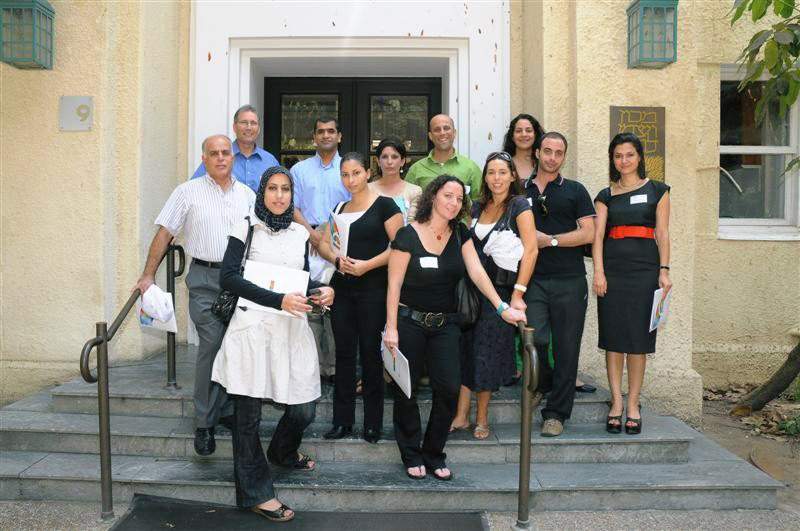The shortest distance between eastern Jerusalem and Rehovot is not necessarily a straight line; sometimes, it turns out, the optimal route passes through Malta. At least, that has been the experience of
Prof. Hasan Dweik, Vice President for Science and Society at Al-Quds University in eastern Jerusalem: He has come to spend a sabbatical at the Weizmann Institute of Science in Rehovot after attending scientific meetings in Malta.
Dweik, a Jerusalem-born polymer chemist educated in the UK, is currently taking part in the development of biomolecular sensors in the laboratory of
Prof. Ron Naaman of the Weizmann Institute’s Chemical Physics Department. He had established contacts with Weizmann Institute scientists about ten years ago at one of the international meetings known as the Malta Conferences or, more formally, “Frontiers of Science: Research and Education in the Middle East.” Held every two years, these gatherings bring together about a hundred scientists from more than a dozen Middle Eastern countries, including Israel, Jordan, Iran, Egypt and Saudi Arabia. Topics range from materials science, nanotechnology and medicinal chemistry to environmental issues of concern to the entire region, such as freshwater scarcity, alternative energy and air pollution.
But the goals of the meetings go beyond science. “The idea is for Israelis and Arabs to meet directly without political pressure, using science as a bridge,” says
Prof. David Cahen of the Weizmann Institute’s Materials and Interfaces Department, who has participated in all six Malta Conferences to date. “At first I was surprised by the atmosphere of openness, which allowed us to meet scientists from all the countries in the region,” says
Prof. Lia Addadi of Weizmann’s Structural Biology Department, another veteran Malta Conference participant.
At Dweik’s initiative, a former chemistry student from Al-Quds earned a PhD under the guidance of Prof. Avi Hofstein and
Dr. Rachel Mamlok-Naaman of Weizmann’s Science Teaching Department; two other Al-Quds graduates, one in physics the other in computer science, are currently enrolled in the Department. “We want to build up a core of scientists who are good educators in order to create our own faculty of science education,” explains Dweik, who founded the Chemistry and Chemical Technology Departments at Al-Quds and in the past served as the University’s Dean for Science as well as Executive Vice President. Before coming to Rehovot on a sabbatical, he himself had worked with Weizmann Institute scientists on projects in science education, developing informal high-school curricula, textbooks and online courses.
The inspiration for the Malta meetings came from the Pugwash Conferences, which had facilitated communication between the Western and Eastern blocs during the Cold War, says Dr. Zafra Lerman, President of the Malta Conferences Foundation. A Weizmann Institute graduate in chemistry, Lerman had originally organized the meetings under the aegis of the American Chemical Society, choosing Malta as the venue because of its neutrality and the safety it offers as an island.
To attract participants, Lerman came up with a unique formula: Plenary lectures at the Malta Conferences are given by as many as five or six Nobel laureates in chemistry, physics or medicine. Spouses are not allowed to join, so as not to “dilute” the interactions among the participants. “It’s known in chemistry that if you dilute the solution, the rate of the chemical reaction is reduced,” says Lerman.
Scientists’ responsibility
Weizmann Institute scientists have formed a significant portion of the Israeli contingent at all the Malta Conferences. In addition, at the latest meeting, Malta VI, held in November 2013, one of the Nobel laureate speakers was the Weizmann Institute’s
Prof. Ada Yonath.
“I’m a big believer that peace must come from the inside, and scientists have a special responsibility in this respect,” Lerman says. “They enjoy a high status in society, both because governments need them to develop weapons and because they improve humanity’s well-being. They can accomplish so much more than politicians.”
Lerman’s dream is to find sponsors for holding the Malta Conferences more frequently. “Billions of dollars are being spent on weapons of mass destruction,” she says. “A small fraction of that could go so far to engage more Israeli and Arab scientists in collaborative projects in order to create a critical mass that will bring about peace.”
Even though universities from the Palestinian Authority maintain no official contacts with Israeli institutions of higher learning, Palestinian and Israeli scientists can and do collaborate on an individual level. In fact, Dweik believes such contacts are extremely beneficial. “I think that as scientists, we have an important role to play in bringing peace to the region,” he says. “We have this piece of land on which we must live together, and we need to cooperate as neighbors. After all, science knows no borders. No matter where you are studying cancer, developing a new drug or solving an environmental problem, you are working for humanity.”
For Dweik himself, the conflict is anything but abstract: It exacted a tragic toll from him and his family. In 1971, when terrorists threw a bomb at the Jewish-owned “Dolphin” restaurant in eastern Jerusalem, Dweik and his younger brother Hussein, both teenagers at the time, were standing nearby on the pavement outside their father’s Modern Bakery. Hussein was killed in the explosion; Dweik sustained multiple shrapnel wounds all over his body. “That’s the price we pay for failing to resolve the issue,” he says. “As long as the conflict persists, human lives will continue to be lost on both sides.”

